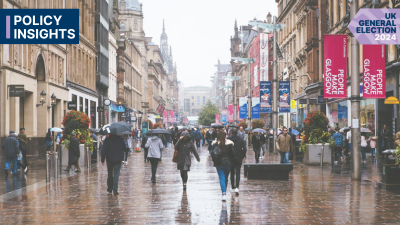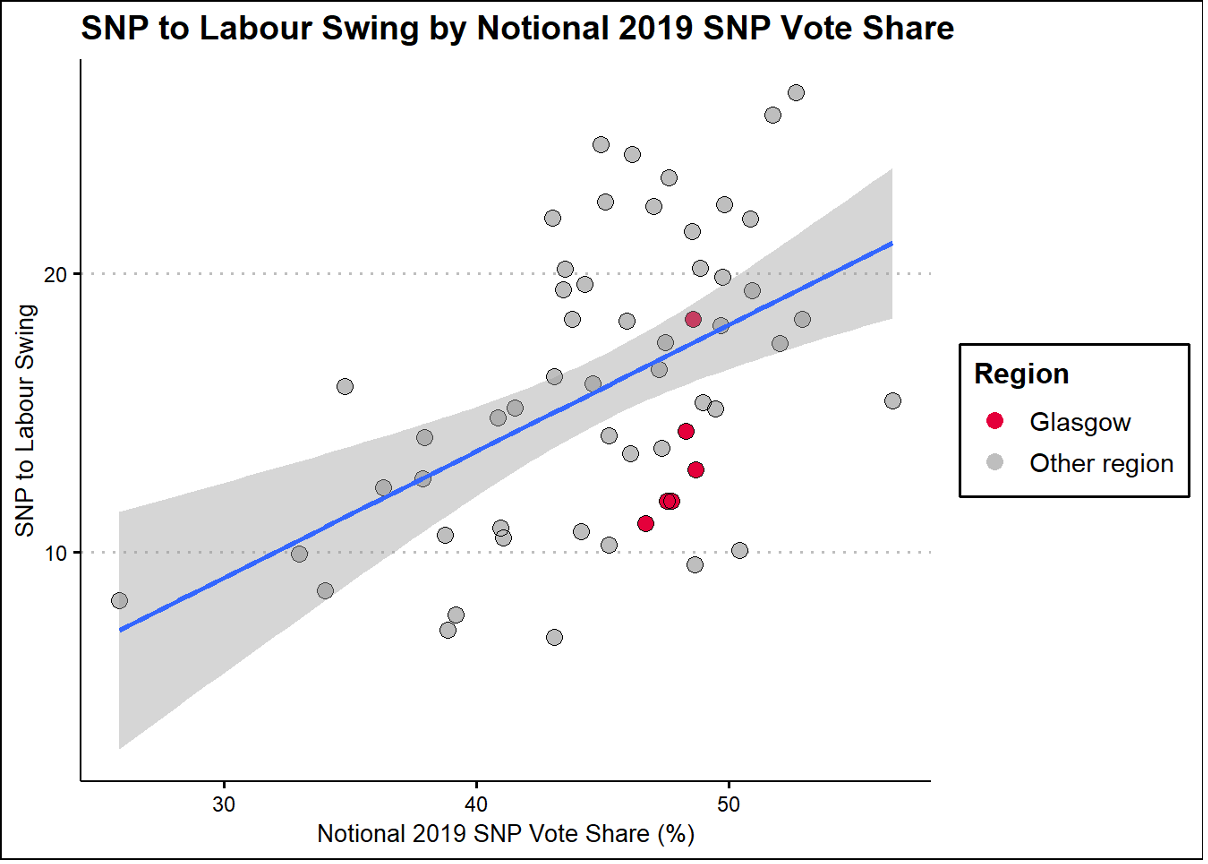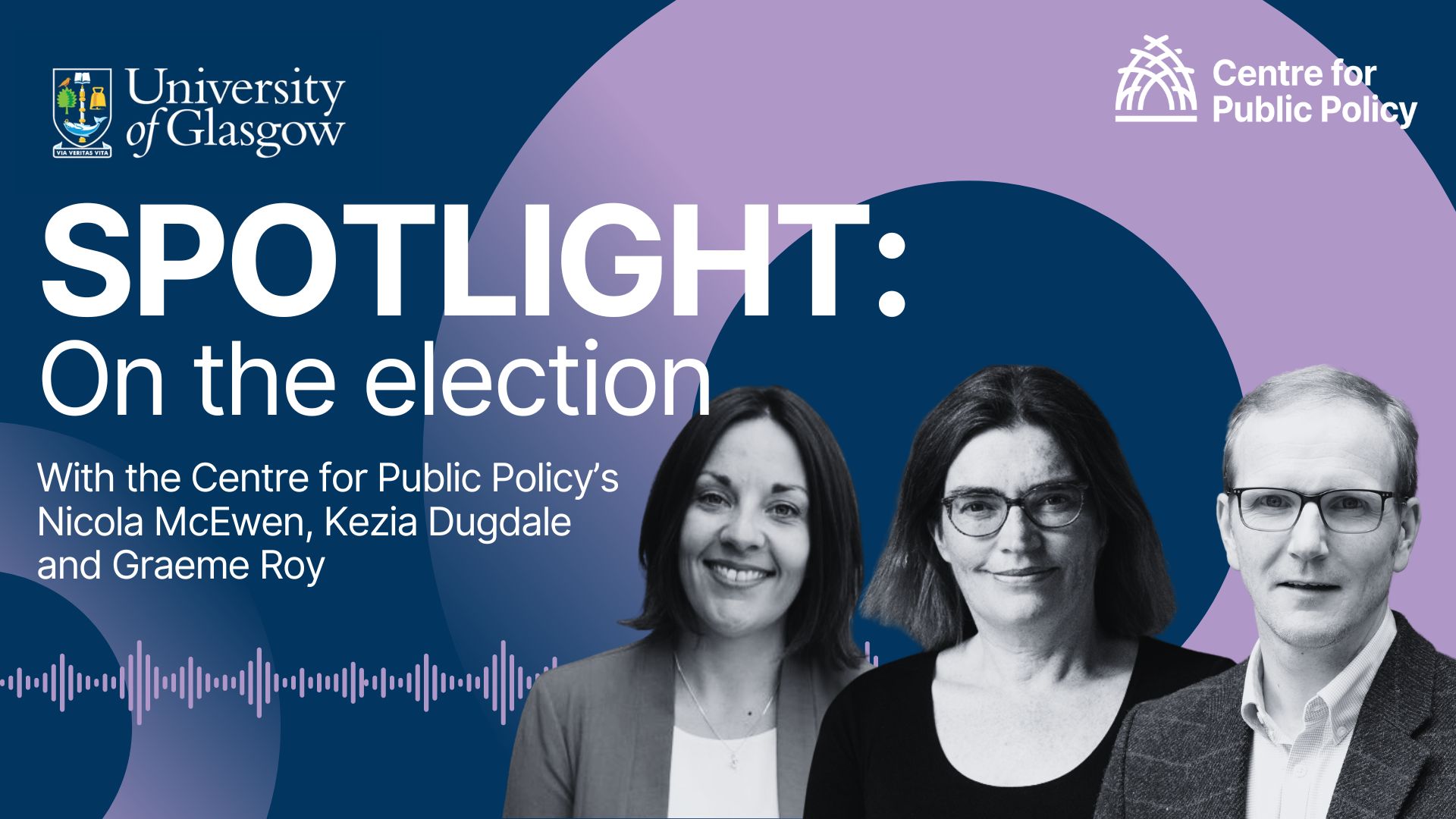How Glasgow Voted in the 2024 UK General Election
Published: 12 July 2024
Policy Insight: Mark McGeoghegan delves into the details of the University of Glasgow’s home city’s voting results, examining the extent of Labour’s success in Glasgow and the nuanced story behind the results.

This blog is part of the Centre for Public Policy UK General Election Policy Insights series.
Author: Mark McGeoghegan, Doctoral researcher in the School of Social and Political Sciences at the University of Glasgow
The 2024 UK General Elections saw the SNP fall to a cataclysmic defeat at the hands of a resurgent Scottish Labour. Across Scotland, Labour gained 36 formerly SNP seats. Having begun the campaign holding 48 of Scotland’s 57 seats (based on the notional 2019 results for Scotland’s freshly redrawn constituencies), the SNP won just nine.
At the heart of Labour’s victory was their rebuilding of what their Scottish leader, Anas Sarwar, had taken to calling the ‘first red wall’ – the stretch of once reliably Labour red constituencies across the Central Belt, with Glasgow’s six constituencies at their heart.
But the story of Glasgow’s election, and what the results say about the city’s historically radical politics, is more nuanced than simply being a brick in Labour’s rebuilt wall of support.
|
UK General Election Results, Glasgow |
||||
|
Party |
Vote Share (%) |
Swing |
Seats Won |
Seats Gained/Lost |
|
Labour |
44.0 |
+11.4 |
6 |
+6 |
|
SNP |
32.3 |
-15.6 |
0 |
-6 |
|
Scottish Greens |
9.6 |
+8.1 |
0 |
0 |
|
Reform UK |
5.6 |
New |
0 |
0 |
|
Conservatives |
4.0 |
-8.2 |
0 |
0 |
|
Liberal Democrats |
2.8 |
-2.4 |
0 |
0 |
|
Alba |
0.9 |
New |
0 |
0 |
|
Others |
0.7 |
+0.7 |
0 |
0 |
While Labour won a larger proportion of the vote in Glasgow than it did nationally and won all six of Glasgow’s seats, the swing from the SNP to Labour of 13.5 points fell short of the national two-party swing of 15.7 points.
We can see this ‘underperformance’ in terms of swing when we look at the SNP to Labour swing across Scotland. That swing was proportional, which means that – as a rule – the SNP lost more voters to Labour where their vote was higher. In five of Glasgow’s six constituencies, that swing fell short of what would be expected based on the national results. The one exception was Glasgow South.

Glasgow South and Glasgow South West are now Labour-SNP marginals, with the two parties separated by 9.8% of the vote in Glasgow South, and 9.2% in Glasgow South West. Glasgow East (10.7%) and Glasgow North (10.2%) are on the verge of being considered marginals, and only Glasgow West (16.2%) can be considered a safe Labour seat. So, while Glasgow, much like the rest of the Central Belt, has been painted red on the Westminster electoral map, its politics remain tightly contested by Labour and the SNP.
For their part, the Scottish Greens had their best general election result ever last week, and they performed better in Glasgow than in any other part of Scotland. Their two best performances came in Glasgow South and Glasgow North, and while they won 4.9% of the vote in constituencies they stood in across Scotland, they performed almost twice as well across Glasgow.
Amid the almost total collapse of the Conservative vote – they lost all six of their deposits and finished behind Reform UK in terms of city-wide vote share – the Scottish Greens cemented their position as Glasgow’s third party, having finished third in the city in the 2022 local elections and narrowly missing out on doing so in the 2021 Scottish Parliament elections.
The election results in Glasgow reflect, in the city’s unique way, the breakdown in party loyalty that we have seen since the 2014 independence referendum. The stability of Scottish politics since 2015 has been rooted not in party loyalty, but in loyalty to a constitutional camp. Less than a fifth of Scottish voters have a strong party identification, but more than two-fifths have a strong identification with a position on independence, Brexit, or both.[i] Voters are more willing to switch parties than in the past, primarily within constitutional camps (which will have benefitted the Greens in Glasgow) but with the decline of the salience of independence and Brexit as issues, they were likely more willing to cross over between constitutional camps in this election, too.
While independence certainly was not the defining issue of this election, 43% of Glasgow’s voters voted for pro-independence parties – more than the 34% Scotland-wide. Just under 70% of Scottish voters voted for parties broadly of the left, compared to 87% in Glasgow.
It would be tempting to slot Glasgow into a very tidy, simplistic story of Labour resurgence across Scotland. But, while Labour’s Glasgow comeback should not be understated, the election results instead paint a picture of a city that remains disproportionately pro-independence and left-leaning, and a city whose politics is, and will almost certainly remain, highly competitive.
[i] See The Referendum That Changed a Nation (2019), p. 153-154.
Author
Mark McGeoghegan is an analyst and columnist writing on Scottish politics and is a doctoral researcher in the School of Social and Political Sciences at the University of Glasgow, completing a thesis on the political tactics of nationalists and secessionists.
Photo by Jason Briscoe on Unsplash
Tune in to our mini podcast series Spotlight: On the election
We’re shining a light on the policy issues, the parties, key battlegrounds and events of the UK General Election, bringing you expert insights from the University of Glasgow and beyond.
Listen and subscribe on Spotify.
First published: 12 July 2024
Policy Insights
This blog is part of the Centre for Public Policy UK General Election Policy Insights series. The series shares research, knowledge and insights on the policy issues facing the country from key voices across the University of Glasgow and beyond.
Read more insights on our News and Insights page.
Mailing list
Sign up to the Centre for Public Policy mailing list to get the latest policy insights and our monthly newsletter straight to your inbox.


